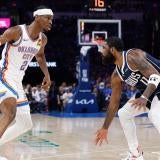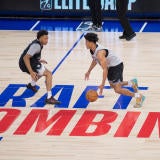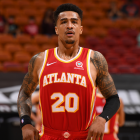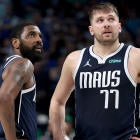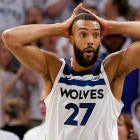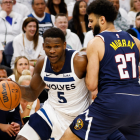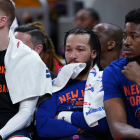
The Boston Celtics are exploring just about every big name on the trade market, and given their flexibility, that aggression is warranted. Boston has a $28.5 million trade exception thanks to Gordon Hayward, and unlike most of the contenders that have mortgaged their futures to add star power, the Celtics still have all of their own first-round picks to offer in trades. There are two new names worth watching if they're willing to put several of those picks on the table: Atlanta big man John Collins, according to The Athletic's Shams Charania, and Sacramento forward Harrison Barnes, according to The Athletic's Sam Amick. Charania noted that Barnes is the likelier acquisition of the two.
Atlanta's asking price for Collins has been predictably high. The 23-year-old big man averaged 21.6 points and 10.1 rebounds per game last season and had extremely efficient shooting percentages. His counting stats are down slightly, but that is also based on Atlanta's offseason acquisitions needing minutes and shots. Collins has largely fit in well alongside the newer Hawks, taking advantage of the talent around him by scoring on low-maintenance cuts and putbacks. His defense has improved this season as well, making him one of the more valuable young big men in basketball.
Barnes is a more traditional trade deadline target. He is a 28-year-old role player that excels at launching 3-pointers and defending opposing wings. He also fits the bill of a traditional Celtics target. Boston reportedly had the chance to trade Hayward for Myles Turner during the offseason and declined, suggesting that Danny Ainge does not want to make a major investment in a big man. His history in Boston supports that theory. The Celtics have largely gotten by spending the bare minimum on big men and focusing on wings like Hayward, Jayson Tatum and Jaylen Brown.
But Collins is a good deal younger than Barnes and given his comfort scoring without needing plays run for him, perhaps a better fit with Tatum and Brown. He has typically played better at power forward than center in his career, something of a rarity among offensively-minded big men who benefit from the extra space that small-ball provides. But he has never played on a contender before. Boston's supporting talent might be enough to turn him into a third star, one so strong offensively that he can survive at center despite defensive limitations.
Boston is ultimately going to devote its assets to a player, not a position. If they see the opportunity to acquire the right big man, they will strike. But history suggests that Barnes is far likelier to wind up in a Celtics uniform due simply to Boston's roster-building priorities. Time and time again, they've chosen wings over big men. Is Collins enough to change their mind? Do they even have enough assets to get him? We'll find out by the March 25 trade deadline.







